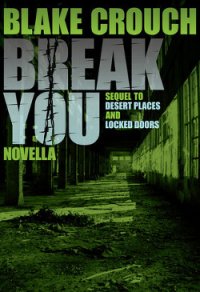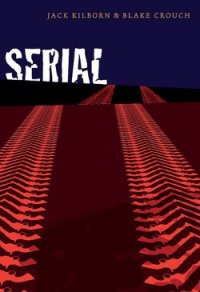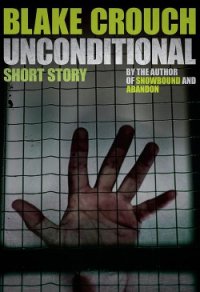Locked Doors - Crouch Blake (читаем книги онлайн .TXT) 📗
Violet sat stoical, a line of dried blood streaked from her scalp across the left side of her face.
There was nothing any of us could say.
We just stared at each other, three souls in hell, waiting for the darkness to come again.
52
LUTHER drilled the last hole into the right armrest. Rufus was screwing a leather ankle strap into the left front leg of the chair. Because the wood was oak the old man had to lean into the Phillips head to make the screw turn.
“Lookin’ good, boys.”
Maxine stood in the narrow stone doorway, a glass of lemonade in each hand, the single bare light bulb accentuating deep creases in her face. “My Heart Belongs to Jesus” was spelled out in rhinestones across the front of her bright purple sweater.
Father and son lay their tools on the dirt floor. Rufus grunted as he struggled to his feet. He walked over to Maxine, leaned down, planted a kiss on her forehead. Her big baby black eyes sparkled, her only feature that showed no age.
“Bless your little heart,” Rufus said and he took the glasses of lemonade from her and went and plopped down beside his son, their backs against the cool stone.
They drank.
Maxine stepped into the small room and sat in the chair.
She lay her forearms on the armrests, looked over at her boys.
“Zzzzzzzzzz!”
The old woman shook violently and laughed.
“Beautiful, you rattle that chair apart, we’ll strap you in for real.”
Luther finished off the lemonade, set it down.
“What’s for supper, Mama?”
Maxine got up, walked over to her son, framed his face in her hands.
“Whatever my good boy wants. What does he want?”
“Boiled shrimp.”
“You gonna help me peel ’em?”
“Yes’m.”
Maxine gently slapped his pale drawn cheeks and lifted the empty glasses.
She said, “Boy, I thought you were gonna take care of Andrew’s and that detective’s cars.”
“I moved them both over to the Pony Island Motel parking lot this morning.”
“Ah. Good. Well, can I say for the record what a colossal waste of time ya’ll are spending on this chair?”
Rufus stood, pushed back his white tresses.
“Now hold on there, Beautiful. Is it a waste of time to spend hours preparing for a fine dinner? You have to think of this as a gourmet meal. It takes a little more time, but it’ll all be worth it in the end. And this isn’t a one-time deal. Once the thing’s built, my God, it’ll last forever. Besides, I’m happy. Down here working with my boy. Making memories.”
Maxine said, “Well, I’m gonna go feed the guests, let them do their business. It’s funny—Andrew still thinks I’m senile from that Alzheimer’s bit I pulled on him.”
She disappeared into the dark corridor.
Rufus gave Luther a hand, helped pull him to his feet.
“All right, son. Once you get that copper plating screwed into the arms, what say we call it a day? I’ll help you and Mom peel the shrimp.”
The downstairs runs the length and breadth of the hundred and eighty-six-year-old house, unique to the island as the vast majority of residences sit several feet above ground to protect them from the flooding nor’easters and storm surges of hurricanes. Consequently, this basement has been underwater numerous times since its construction.
It served as slave quarters in the 1830’s.
Servant quarters at the turn of the century.
One of the most extensive wine cellars in North Carolina in the 1920’s.
A decade ago Rufus wired several rooms and passageways for electricity.
The rest are lit by candle or not at all.
The stone in one of the rooms is charred black all the way up to the ceiling.
In another the rock is stained burgundy.
Though Luther has spent a great deal of time down here, he’s still prone to losing his way, particularly when he ventures beyond the cluster of rooms near the stairs, a maze of confusing corridors that were lined with wine racks eighty years ago. Broken glass and pieces of cork can still be found in some of the nooks and crannies.
Now Luther slips soundlessly through a pitchblack corridor, feeling his way along the wall. His parents are busy upstairs preparing food. He’ll join them shortly.
At last his fingers register the break in the wall—the alcove where Andrew and the women wait.
Luther stops, leans against the stone, listens.
No one is talking. He hears breathing. Chains clinking.
The little blond has been chained facing the doorway. Perhaps tomorrow he’ll come back when the light slips through so he can watch her from the shadows. But it’s enough now to know that she sits there, just a few feet away, sharing the darkness with him.
53
HORACE Boone pulled off Kill Devil Road and parked his Kia in the sand behind a yaupon shrub. Reaching into the backseat, he grabbed the flashlight he’d purchased earlier this afternoon at Bubba’s Bait and Tackle.
It was nearing 10:00 p.m. on a cold and glorious November Monday, the sky more milky, star-ridden than any night in the last three years. Loading his precious purple notebook into a small backpack, he climbed out of the car, shut the door, stepped out into the road, blending seamlessly into the dark in black jeans, hiking boots, and a chocolate-colored fleece pullover.
The night was windless, the first killing frost of the season beginning to blanch blades of grass and island shrubs. He started walking, past the mailbox, down the shadowy drive, the ceiling of live oaks and Spanish moss shielding the starry sky. Horace almost turned on the flashlight but then decided it might be prudent to arrive unannounced.
He broke out of the grove and there loomed the House of Kite—crumbling masonry and rectangles of orange windowlight embossed against the blackwater sound. Andrew Thomas had come here twice last week, presumably in search of Luther Kite. Before abandoning Ocracoke and his dream for good, Horace felt an inexplicable pull to see this manor for himself.
He crept along the perimeter of the live oak thicket until he faced the side of the house. The yard was a field of waist-high weeds. He dropped to the ground, crawled through them, the icy fingers grazing his cheeks.
The moon lifted out of the live oaks, lit the sound.
Horace scrambled to the corner of the great stone house. Rising, he palmed the granite, fuzzy with frosted fungi. Two steps and he peered through a tall and narrow window. The room was dark, empty. Bare bookshelves abounded. Embers glowed in a distant corner.
Horace crept to the other side of the stoop where he knelt finally beneath the only lighted window on the first floor.
He crouched in the sandy soil to rest.
The night aged silently.
He gazed up briefly into the stars, his breath clouding now in the damp southern chill.
When he’d caught his wind, Horace turned and faced the house.
He rose up slowly to the window ledge, stole a glance inside.
He ducked down instantly, back against the stone, replaying what he’d just seen—a living room steeped in firelight, decaying furniture, and a pale-faced man with long black hair sitting directly across from him on a couch, staring through the window into nothing.
Horace heard footsteps. He stood, peered back through the glass in time to see the long-haired man exit the living room into a foyer, where he stopped beneath a staircase. Plucking something off the wall, he reached forward, opened a little door, and stepped through into total darkness.
Two seconds later, it hit Horace between the eyes—he thought of Andrew’s manuscript, Desert Places, and his descriptions of a man with long ebony hair and a pale “baby ass-smooth” face.




